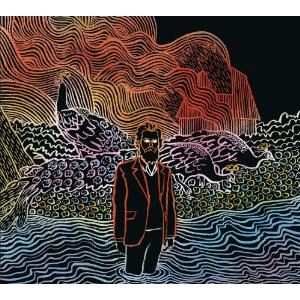
Warner Bros.
It turns out John Updike has nothing on Iron and Wine. Having read Sam Beam’s stated intention to recreate the 70’s radio of his youth on Kiss Each Other Clean, I thought it appropriate that the 6th track, “Rabbit Will Run,” might pay homage to Harry ”Rabbit” Angstrom, the fictional character that Updike is best known for. Admittedly, the first novel in the “Rabbit” series, Rabbit, Run, was published in 1960 but Angstrom’s problems really manifested themselves in the nation’s consciousness during 70’s. Divorce, infidelity, abortion, drug addiction, Vietnam, and bad polyester were all on Rabbit’s menu and so, knowing Beam’s thematic inspiration and without actually having listened to the album, my first glance at #6’s title led me to think of Updike’s rabbit.
Then I listened to the track.
No amount of Updikeian malaise could match the lyrical brimstone conjured up on “Rabbit Will Run” and indeed the whole of Kiss Each Other Clean. Beam invokes vivid calamity with lines like “Last I saw mother she blew me a kiss, when they caught me the cups caught the blood from my wrists, ‘cause a rabbit will run and pig has to lay in its piss.” A veritable menagerie of copulating lions and lambs, bossy monkeys, and filthy pigs walk among biblical caricatures named Gabriel and Lazarus, godless brothers and pistol waving prisoners that preach in Sam Beam’s world. It’s a lyrical picture that is just abstract enough to be interesting but still concrete enough to be meaningful. I’m now fairly certain now that Beam did not sit around reading Updike in his off hours away from the studio and, much more likely, the Old Testament was on his night stand for lyrical inspiration.
Likewise, and this I am 100% on, he wasn’t listening to Dan Fogelberg and the Bee Gees or any AM gold type 70’s radio superstars for musical inspiration. Instead there are diverse influences at play here. I’d imagine that the radio of Beam’s youth was comprised of acts like Crosby, Stills, Nash and Young, Herbie Hancock, Stevie Wonder, and Steely Dan, as the spirit of all of them are present on the album without being referenced overtly.
Kiss Each Other Clean is somewhat of a sidestep from the hushed acoustic shuffle of the previous Iron and Wine records. It’s not quite full departure though; some of the electronic blips and skronks that are so out in front on this record were present at least in the background on Iron and Wine’s three previous albums. Saxophones, electric pianos, clavinets and bulbous bass grooves are all on the offing. If you’re expecting some rootsy folk consider yourself forewarned before you take in the funky romp of “Big Burned Hand” or the gritty guitar vamp of “Your Fake Name Is Good Enough for Me,” with its stax-esque horn arrangements.
Regardless of the instrumental adornments on an individual track is the fact that the heart of Iron and Wine’s efforts is quality song craft. “Tree by the River,” a breezy remembrance of teenage love, would be a timeless tune if it was played solo acoustic or with a full orchestra. It might be the best litmus test you can apply to a songwriter of Beam’s ilk, would it sound good with just you and a beat up acoustic guitar? What makes Kiss Each Other Clean such a pleasurable listen is that most of its 10 tracks would pass that test with flying colors.



No Comments comments associated with this post